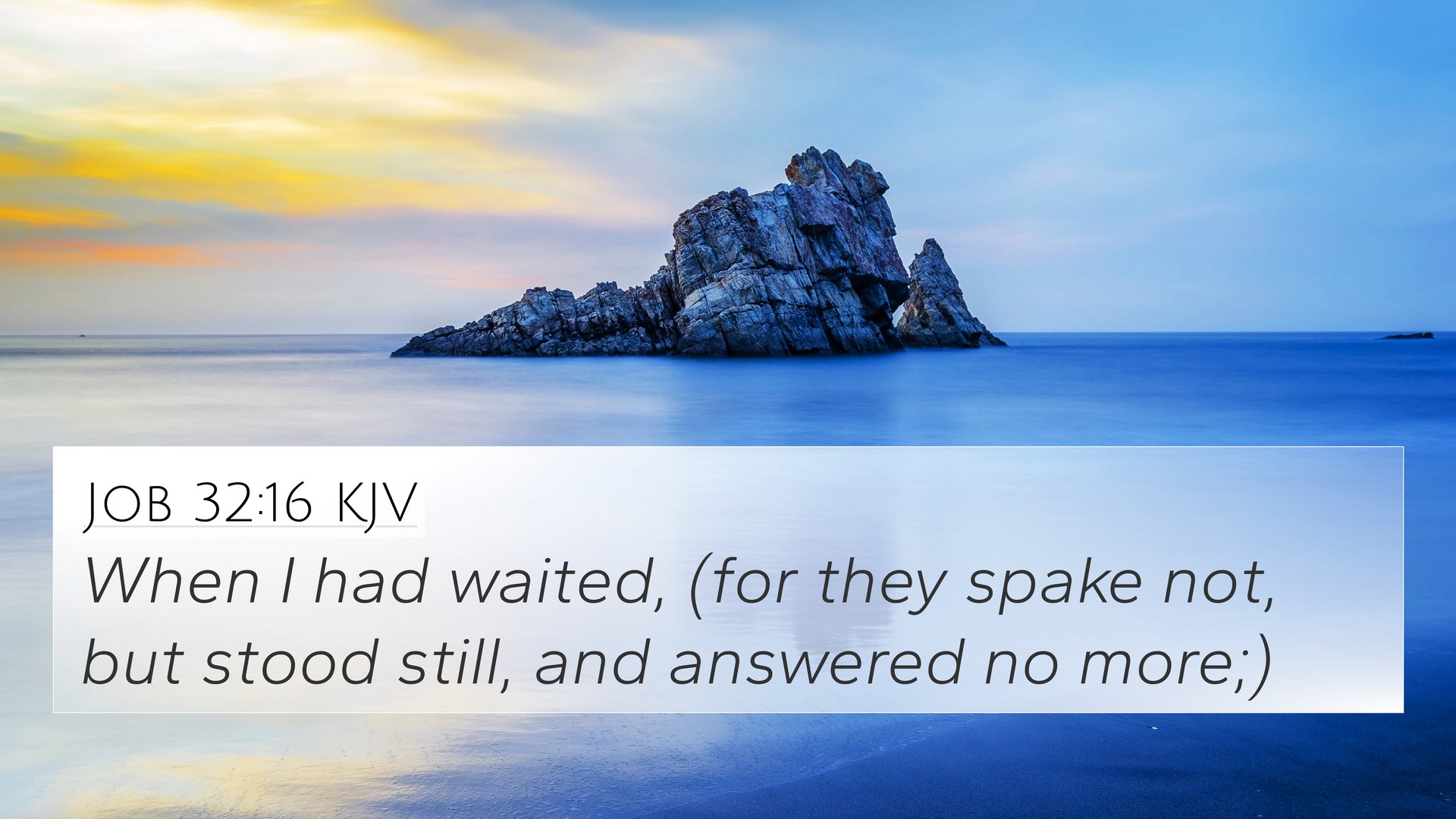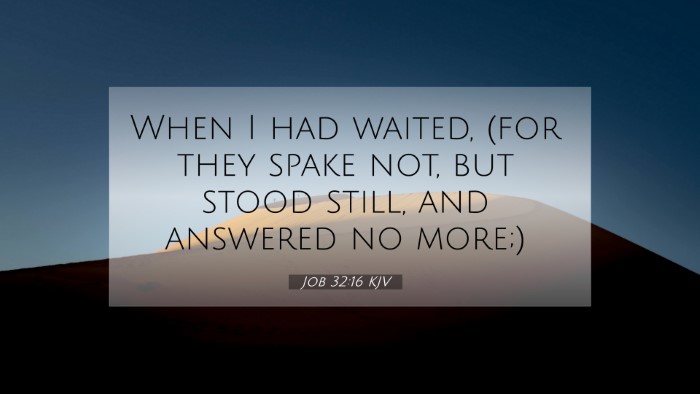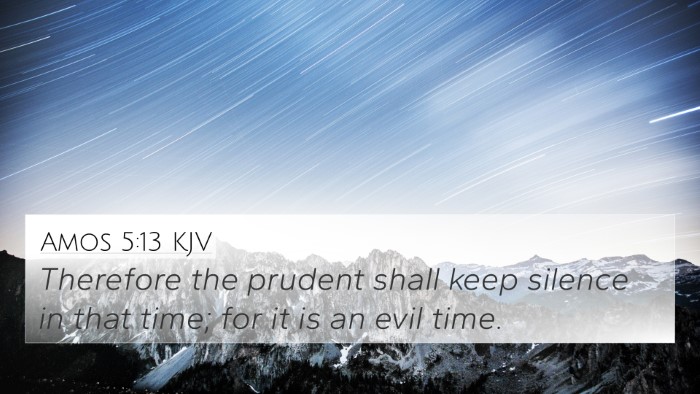Old Testament
Genesis Exodus Leviticus Numbers Deuteronomy Joshua Judges Ruth 1 Samuel 2 Samuel 1 Kings 2 Kings 1 Chronicles 2 Chronicles Ezra Nehemiah Esther Job Psalms Proverbs Ecclesiastes Song of Solomon Isaiah Jeremiah Lamentations Ezekiel Daniel Hosea Joel Amos Obadiah Jonah Micah Nahum Habakkuk Zephaniah Haggai Zechariah MalachiJob 32:16 Similar Verses
Job 32:16 Cross References
When I had waited, (for they spake not, but stood still, and answered no more;)
Uncover the Rich Themes and Topics of This Bible Verse
Listed below are the Bible themes associated with Job 32:16. We invite you to explore each theme to gain deeper insights into the Scriptures.
Job 32:16 Cross Reference Verses
This section features a detailed cross-reference designed to enrich your understanding of the Scriptures. Below, you will find carefully selected verses that echo the themes and teachings related to Job 32:16 KJV. Click on any image to explore detailed analyses of related Bible verses and uncover deeper theological insights.

Proverbs 17:28 (KJV) »
Even a fool, when he holdeth his peace, is counted wise: and he that shutteth his lips is esteemed a man of understanding.

James 1:19 (KJV) »
Wherefore, my beloved brethren, let every man be swift to hear, slow to speak, slow to wrath:
Job 32:16 Verse Analysis and Similar Verses
Understanding Job 32:16
Job 32:16 states: "And I waited, for they spoke not; but stood still, and answered no more." This verse is part of a dialogue focusing on the deeper themes of understanding, silence in wisdom, and the frustration of waiting for meaningful responses in the face of suffering.
Summary of Meaning
This verse reflects the character of Elihu, one of Job's friends, who is frustrated by the lack of meaningful discussion among Job and the other friends. He has been listening patiently, waiting for them to provide an adequate explanation for Job’s suffering. Elihu's remarks focus on the silence of his companions, highlighting a key aspect of his own struggle in communicating profound truths amidst their futile debates.
Insights from Commentaries
- Matthew Henry: Henry emphasizes Elihu’s role as a mediator whose silence reflects the seriousness of the discourse. Elihu waited for wisdom to emerge from others but became aware that their silence was a missed opportunity for true understanding.
- Albert Barnes: Barnes points out that Elihu, as a younger man, shows respect for the older friends' wisdom even while growing impatient with their inaction. His waiting signifies maturity and a desire to engage sincerely rather than merely criticize.
- Adam Clarke: Clarke's commentary states that Elihu's patience represents divine wisdom. His frustration at the silence may indicate a divine purpose in suffering where solutions are not always immediately accessible.
Thematic Connections
This verse can lead to a broader discussion on the connections between silence and wisdom in the scriptures. Elihu’s waiting mirrors instances in the Bible where silence is portrayed as a wise response, allowing time for reflection and revelation.
Cross-References
Here are several related Bible verses that enhance the understanding of Job 32:16:
- Proverbs 17:27-28: "He who has knowledge spares his words, and a man of understanding is of a calm spirit." This aligns with Elihu's choice to wait for the right moment to speak.
- Ecclesiastes 3:7: "A time to keep silence, and a time to speak." Elihu's waiting illustrates the importance of knowing when to listen and when to engage.
- James 1:19: "Let every man be swift to hear, slow to speak, slow to wrath." Elihu embodies this principle, encouraging thoughtful dialogue rather than hasty speech.
- Psalms 62:1: "Truly my soul waits upon God; from him comes my salvation." Elihu’s wait for dialogue underscores a spiritual waiting on God for wisdom.
- Job 13:5: Job expresses frustration over his friends' silence, as he cries out for answers. This reflects Elihu's internal tension as he observes the discourse.
- Proverbs 18:13: "He who answers a matter before he hears it, it is folly and shame to him." This validates Elihu’s hesitance to speak prematurely.
- Job 34:31-32: Elihu himself challenges Job’s assumptions. His thoughts escalate here, leading toward a point where he feels the need to contribute his understanding after the silence.
Conclusion
Job 32:16 serves as a pivotal moment of reflection in the narrative of Job, particularly emphasizing the importance of patience and the quest for genuine understanding in the face of suffering. By cross-referencing other verses, one can observe a common thread throughout scripture regarding the value of silence, reflection, and the eventual pursuit of truth in dialogue.
Cross-Referencing Bible Study
For those interested in deeper study, this verse opens the door to principles surrounding Bible verse cross-references. Understanding how different Bible verses that relate to each other can cultivate a richer grasp of theological themes. Utilizing tools for Bible cross-referencing such as concordances can greatly enhance one’s study experience. Whether it's through a Bible cross-reference guide or other resources, recognizing the thematic connections in scripture will provide greater insight into the divine conversations preserved in the texts.
Final Call to Action
To explore connections between Bible verses, consider starting with the provided references and reflecting on how they illuminate the silent and spoken interactions in Job’s account. Engage in cross-referencing Bible study methods to unlock layers of meaning and develop your understanding of Biblical themes more deeply.




